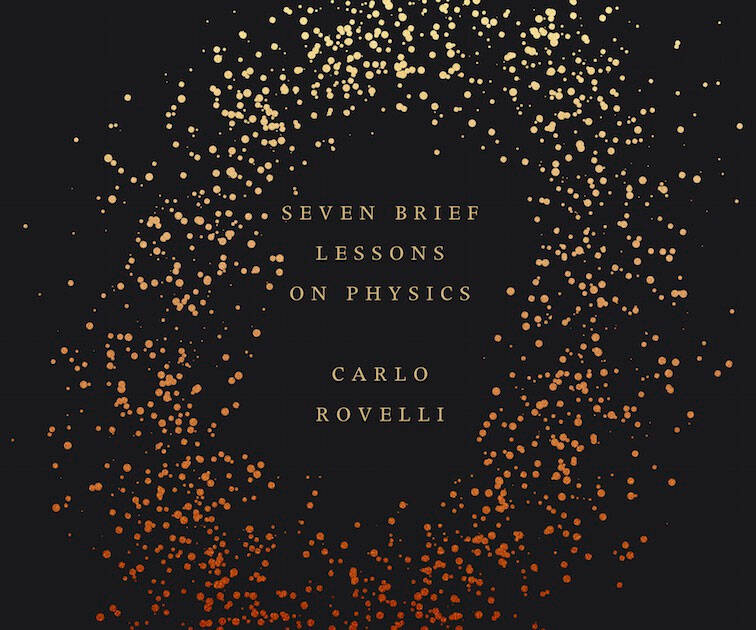Seven Brief Lessons on Physics | |||||||||||
| |||||||||||
Product Description
The New York Times bestseller from the author of The Order of Time and Reality Is Not What It Seems“One of the year’s most entrancing books about science.â€â€”The Wall Street Journal
“Clear, elegant...a whirlwind tour of some of the biggest ideas in physics.â€â€”The New York Times Book Review
Â
This playful, entertaining, and mind-bending introduction to modern physics briskly explains Einstein's general relativity, quantum mechanics, elementary particles, gravity, black holes, the complex architecture of the universe, and the role humans play in this weird and wonderful world. Carlo Rovelli, a renowned theoretical physicist, is a delightfully poetic and philosophical scientific guide. He takes us to the frontiers of our knowledge: to the most minute reaches of the fabric of space, back to the origins of the cosmos, and into the workings of our minds. The book celebrates the joy of discovery.  “Here, on the edge of what we know, in contact with the ocean of the unknown, shines the mystery and the beauty of the world,†Rovelli writes. “And it’s breathtaking.â€
Top Reviews
Rovelli prints just to show you what it looks like. It's not very famous unless you are already ...by Robert P Gelms (5 out of 5 stars)
June 26, 2016
It's Not What You Think
By Bob Gelms
I have two science books that, over the years, have become my favorites, The Elegant Universe and The Field. I have just found a third, Carlo Rovelli's Seven Brief Lessons on Physics. Keep reading, it's not what you think.
First of all I have to tell you that there isn't any math in the book. There is one equation that Mr. Rovelli prints just to show you what it looks like. It's not very famous unless you are already a physicist. In the preface he states, "These lessons were written for those who know little or nothing about modern science. Together they provide a rapid overview of the most fascinating aspects of the great revolution that has occurred in physics in the twentieth and twenty first century..."
In the spirit of Mr. Rovelli's book, physics is the concrete explanation of the magic of the universe. It is the search for the truth about how everything in the universe operates interdependently on a grand scale (galaxies) and on the minute scale (electrons, protons, neutrons, quarks, gluons, etc.) This search, at times, has been fraught with the real danger of losing your life. Galileo was almost burned at the stake, commuted to life imprisoned under house arrest, for simply saying that the Earth revolved around the Sun. Scientists in the twentieth century are a little better off.
The book is very short. If you have the print version, it's 81 pages long, with only seven chapters called lessons. It starts at the beginning of the twentieth century with, next to Isaac Newton, the most important physicist in all of history, Albert Einstein. Einstein's theories are simply and elegantly explained in plain non-scientific language. The culmination of his work is called A General Theory of Relativity, in addition to three or four other papers that were glossed over and initially laughed at.
Once the scientific community caught up with Einstein's brain they were struck dumb with the beauty and simplicity of his vision for the operation of the universe. It has always struck me curious that when he won the Nobel Prize it wasn't for relativity (E=MC2). It was for one of those glossed over papers on the nature of light. He did all of his work on relativity and the photoelectric effect in 1905, when he was 26 years old. Over the years, he became a towering giant in the history of science while remaining a gentle and kind man.
The second lesson covers the exact opposite of Einstein's theories. Planck, Bohr, and Heisenberg all contributed in some degree to the theory of the littlest "things" in the universe, which came to be called quantum mechanics. It deals with atoms and the particles that make them up, showing how they interact with the ever-changing landscape around and in them. Then all hell broke loose.
It seems that the rules and regs that describe perfectly Einstein's big universe of galaxies, stars, solar systems and planets do not work if you apply those rules and regs to the little world of quantum mechanics. Conversely if you take the rules and regs of the little universe of quantum mechanics and apply them to Einstein's big universe you will find that they don't work. WELL. Both theories contradict one another and they shouldn't because they both work perfectly in their own space and time. The big prize in physics these days is to find the link between the two because it is inherent in both theories that there be something that draws them together. Einstein called it the unified field theory and he tried to find it his whole life. He failed.
Lessons One, Two and Seven are the far and away the most interesting and most important in the book. The other essays cover more popular topics like time, black holes, probability, particles, and a lesson called Grains of Space which is a brief explanation of a theory founded by Mr. Rovell, himself a theoretical physicist. In it, he attempts, I think, to reconcile the big with the small worlds of physics. It is called loop quantum gravity and it's where general relativity meets quantum mechanics.
In many ways the most interesting of all the essays is the last one. It's simply called Ourselves. This is where Mr. Rovelli attempts to equate us, homo sapiens, to the interworking of the universe. We are all made of stardust put together using the immutable laws of nature. Our bodies conform to how the atoms we are made of obey quantum mechanics and the way in which we pass through time and space. It is utterly fascinating. I had an "oh wow" moment.
I'd like to close with Mr. Rovelli's words. "Here, on the edge of what we know, in contact with the ocean of the unknown, shines the mystery and the beauty of the world. And it's breathtaking."
I was disappointed. His book fails to deliver on his promise
by Samuel M. Feldman (1 out of 5 stars)
May 9, 2018
I heard Dr. Rovelli's discuss his book "Seven Lessons on Physics" on public radio and immediately purchased it for my Kindle. I was disappointed. His book fails to deliver on his promise. He did not choose the best examples and I found his explanation flawed and convoluted. My question to him is why did he bother, when there are so many really excellent physics books for non-scientists all available on Kindle? I would strongly recommend "The Cosmic Code" by Heinz Pagels and "Six Easy Pieces" by Richard Feynman. (Note: This reviewer has advanced degrees in physics and has taught physics at a college and high school level for the past 15 years.)
Dr Samuel Feldman
A beautiful and poignant meditation on the laws of physics and our place in the cosmos
by Ashutosh S. Jogalekar (4 out of 5 stars)
February 23, 2016
Every once in a while it's a good idea to stand back from the daily necessities of our lives and look back and marvel at what we as human beings have accomplished in our understanding of ourselves and our universe. In very few instances is this wonder more apparent than in an appreciation of the discoveries that physics has made regarding space and time.
In this short and highly readable book, Italian physicist Carlo Rovelli leads us through a tour of what he thinks are seven of the foremost ideas (or "lessons') in physics. These are ideas which have not just furthered our understanding of our material world but which have also expanded our consciousness and connected us to our origins and future. Rovelli's writing is often poignant and beautiful, simple and without frills and from the heart, and I would be lying if I said the experience wasn't uplifting. Personally I would have included an extra eighth lesson on chaos theory and complexity since I think those are going to be key scientific issues in the 21st century. Also, there is little new per se in here which would not be familiar to physics aficionados. But as it stands Rovelli's offering is a marvelous feast which should ignite a renewed sense of inspiration regarding the reach and beauty of science even in hardened veterans.
The first lesson is about Einstein's general theory of relativity which saw yet another towering validation this year with the discovery of gravitational waves. The Russian physicist Lev Landau called it the "most beautiful theory" and I would say there would be few contenders for that title. The basic equation of the theory fits on a napkin, and the essentials of the framework are both startling and elegant. As Rovelli explains, Einstein's major breakthrough was to realize that Newton's gravitational field is not a field at all but is spacetime itself. That one insight suddenly elevated all of physics to a completely new level and it opened up previously unimaginable vistas - black holes, neutron stars, radio astronomy, the Big Bang - to deep exploration. Here's Rovelli on the essential craziness of Einstein's equation: "Within this equation there is a teeming universe. And here the magical richness of the theory opens up into a phantasmagorical succession of predictions that resemble the delirious ravings of a madman, but which have all turned out to be true."
The second lesson concerns the other big revolution of twentieth century physics - quantum mechanics. Relativity is astonishing but its basic tenets are easy to understand. In contrast, even the basic tenets of quantum theory - wave particle duality, entanglement, the uncertainty principle - have left even the theory's great founders befuddled. Quantum mechanics is unique in the history of science as a theory which is spectacularly successful in its practical applications while at the same time continuing to be virtually impenetrable in its philosophical implications. It opened up vast new areas of modern life to understanding; without it computers, chemistry, electronics and molecular biology would be inconceivable. And yet the sheer weirdness of its laws continues to defy every commonsense expectation. Rovelli zeroes in on one of the essential qualities of quantum mechanics when he says that its laws "do not describe what happens to a physical system but only how one physical system affects another". I find it interesting that the same interactions which lie at the heart of quantum theory also underlie the science of emergent complex systems like the weather, the stock market, biochemical networks and social networks.
The third chapter talks about the Big Bang theory and the architecture of the cosmos. Rovelli wrote just before the discovery of gravitational waves otherwise he would have included them in his discussion but he talks about many other wonders revealed by Einstein's theory combined with many of the tools of modern physics such as radio telescopes and particle detectors. The culmination of applying relativity to the universe must surely be the discovery of the accelerated expansion of the universe, although the presence of what we call "dark matter" leaves something to be desired.
The fourth lesson tells us how the findings of quantum mechanics led to an explosion of understanding of the building blocks of the cosmos in the postwar years. Quarks and electrons, Higgs bosons and neutrinos all make important appearances in this story. The culmination of all this progress was the Standard Model of particle physics, essentially a kind of periodic table which lists all known particles and their properties. And yet unlike general relativity the Standard Model is incomplete. Many of the particles' parameters are poorly understood, and the model itself is incompatible with general relativity. In addition there are ugly infinities arising in the theoretical treatment of all those particles which have to be tamed by artificially imposed mathematical order. These deficiencies make the Standard Model very much of a model. It is in the Standard Model that we start to glimpse the first troubling signs of how much more we have to discover in fundamental physics. But in trouble lies opportunity and glory, and in one sense the Standard Model only points to the bounty of undiscovered delights which must surely lie ahead.
The fifth lesson tackles one of the greatest scientific facing science, the marriage of general relativity with quantum mechanics; a marriage which as of now seems to end in violent, unholy divorce every time we attempt it. Interestingly there is not a word about string theory, probably because Rovelli himself works on a rival theory called loop quantum gravity. There is a capsule description of the theory which emphasizes again the fact that the framework is less about objects themselves and more about their interconnections. In this case the connections are between tiny quanta of space - which are themselves space.
The sixth lesson takes us on a journey into one of the most exciting frontiers of modern physics: the union of thermodynamics, quantum mechanics and relativity. This union is wondrous and critical because it can help us understand perhaps the deepest question we can ponder: the fact that time seems to flow only in one direction. As Rovelli explains, the arrow of time seems to be inextricably linked with the flow of heat. The second law of thermodynamics and its postulated increase of entropy tracks with the forward arrow of time, although on an individual particle level this arrow is reversible. Figuring out these conundrums of time and thermodynamics will undoubtedly take us into some very novel territory. In this context Stephen Hawking's discovery of radiation emanating from black holes is surely a promising springboard. Time, thermodynamics, quantum mechanics, relativity, statistics; it's all here, and it's all tantalizing.
The seventh lesson ties it all up together as Rovelli talks about the ultimate entity that allows us to figure all this out - the human brain. He ponders the delectable paradox that an entity which is composed of particles and fields and quanta can also decipher its own mysteries. Understanding this self-recursive extrapolation should keep us occupied for as long into the future as we can imagine, and it's also what should make us cherish our unique existence as sentient beings on this planet. And yet, as unique as we are, Rovelli reminds us in closing that our lowly origins from elemental life forms and the ordinariness of our planet, our solar system and our galaxy should not blind us to what might be the greatest lesson of all: humility and wonder.
"Here, on the edge of what we know, in contact with the ocean of the unknown, shines the mystery and the beauty of the world. And it's breathtaking".
Nice light reading until Chapter 7
by Michael J (4 out of 5 stars)
December 16, 2016
This is a lovely little book with a half dozen very readable chapters on physics, which is the study of how material reality is constructed. That seventh chapter is full of mush about reality, which you may value, but it isn't physics. Sig. Rovelli seems to accept only one reality - material reality. This puts him at odds with The Road to Reality: A Complete Guide to the Laws of the Universe by Roger Penrose. That book is a big fat thing available for about the same price as Rovelli's, To an American Mathematical Society review, "For anybody who wants to learn up-to-date physics at a level between standard popularization and graduate text, The Road to Reality is the only book in town." Review is at[...]
Penrose proposes interlinked realities of math, mind and matter at the beginning of his book, and revisits the proposition at the end. The Platonic reality of mathematics, a portion of which underlies all of physics, isn't generally accepted. Mind as distinguished from brain is also anathema. It's as much easier to accept Rovelli's views in that last chapter as it is to read his book, but it's a problem chapter which I think is too 19th century and for that reason wrong. Reality is an impossibility shrieking for an explanation - Penrose accepts the burden, Rovelli does not.
Brilliant and inspiring.
by Saganite (5 out of 5 stars)
March 7, 2016
I see the two-star reviews are criticizing, for the most part, exactly what I loved about this book. Yes, it is VERY brief. Bluster? More like cheerleading. This is a book to whet the appetite. It's a before-dinner glass of heady, delicious wine, not the meat course. If I were a physics teacher (and not just for advanced or theoretical physics, either, but even of more basic sorts), I would assign this book first thing. Because it implies that that the work of physicists aims at awe, reverence, understanding wrapped in mystery. Oh! Oh! Now I am doing it too! Apparently it's not even possible to write ABOUT this book without employing some purple prose. But in fairness, if there is one topic that demands levels of prose that infringe on poetry's realm, it is what is contained in the seven brief lessons. I can't wait to start giving this as a gift to friends and family. And I cannot recommend it more highly. And while I'm on about it--I wish m any more books would be this admirably short. My partner and I read it in a couple of hours and then talked about it for several more. What's better than that?
A Must read, but with a bit of disappointment too
by Jay Michlin (3 out of 5 stars)
June 24, 2016
Good book, well intentioned, if a bit brief at 81 pages of fairly large print. My disappointment was that the author's attempts to explain various advanced aspects of physics seemed to come up short. Just as I thought I was "getting it", the author moved on to the next topic. Speaking for myself, a somewhat more detailed treatment would have been welcome. I also had trouble with his last chapter on how we fit in as people. That seemed to me to cross the line from serious physics to metaphysics, philosophy and -- dare I say it -- even a bit of religious conviction. All of that said, it's probably a must read. Just prepare for a bit of disappointment.
A basic primer on Physics ~ Important information that will help you better understand the subject
by Expressed Reviews (4 out of 5 stars)
December 22, 2016
I've always been interested in physics and the major impact that it has, and has had on the world. The problem for me, is that up until now, I've had a very difficult time understanding the material presented in most books on the subject. This book, however, while certainly very short and basic, does help to explain some of the major theories, without your needing a background in the sciences to comprehend. While I've read many books on the subject, in almost all cases, I haven't been able to get through them. This one is an exception, as it's designed as a very basic primer.
Clearly written and understandable for the layman, this book provides insights that will leave you wanting for more thorough explanations. Since many of the most important theories and discoveries of the past 100 or so years revolve around an understanding of physics, the material in this book is very important to know. The principles of theoretical physics have had profound impacts on society, both very good and horrendously bad. Acquiring a basic understanding of an extremely complex subject isn't easy. In that regard, this book helps out. Now that I've finished it, I'll be looking for additional books that's are also basic, but somewhat more substantial than this one was.
Very good!
by I am falling in love with my life (5 out of 5 stars)
May 9, 2017
In the preface, it says;
"These were written for those who know little or nothing about modern science."
The book includes seven lessons on modern physics, say, relativity, quantum mechanics, and cosmology. I finished the book only half a day. It was possible because the book was easy to read and the total pages were less than 90 pages. Many other authors say the same thing in their prefaces, but most of them are liars. But what Rovelli said was true.
You may be a general reader who is interested in the problem of confliction between general relativity and quantum mechanics or the questions about the Big Bang such that what there was before the Big Bang. Or, the questions about time such that time is real. If so, I'd like to strongly recommend the book to you. In solving the problem and questions, since 1980s, there has been some progress, called loop quantum gravity. The author is one of the founders of the theory. Under the light of the theory, the author introduces readers to modern physics in a friendly tone, but never fails to focus on the key points.
Personally, I am interested in Buddhism. Buddha says that if a man achieves "the greatest realization", then, to him, time is an illusion. Reading the book, I thought that loop quantum gravity could give a scientific explanation for it.
But the book was not perfect for me. In the seventh lesson, the author speaks about human beings. The theme question is what the meaning of human beings in the universe is. However, the lesson seems overly speculative. Except the seventh lesson, the book was all good.
3 GOOD PHYSICS CHAPTERS AND ONE TERRIBLE PHILOSOPHY ONE
by R.B. (3 out of 5 stars)
May 7, 2017
Interesting, understandable takes on the likes of relativity and quantum mechanics. But when he turns to philosophizing, like many physical scientists, he delivers, however loftily, the same tired old mantras about determinism, no free will, etc., that you can get in any freshman philosophy course -- only at least there they give you the counterarguments and don't regard these as anything close to settled matters. Stick to what you know, Dr Rovelli.
Informative But Biased
by Yakov Bronsteyn (3 out of 5 stars)
January 3, 2019
The author expertly, in pretty much, layman's terms explains the basics of Newtonian Science, Theory of Relativity, Quantum Mechanics, their combinations such as Loop Quantum Gravity Theory, and their derivatives. It's very informative but in some instances hard to understand because of brevity and mathematical attestations.
In the last chapter the author ponders life from a philosophical point view using the book's summary of Physics as a foundation. He determines that we have no free will. The fact that it seems to be the case is only because of the complex structure of our brains akin to the size of the Universe. Also, that there isn't anything special about our existence. We are a combination of quanta just like anything else in the Universe.
It's surprising that the author conclusively decides this after acknowledging throughout the book that we lack basic knowledge about the structure of the Universe.
For example, in the Loop Quantum Gravity Theory we don't know in which structure are the quanta found that make up the space-time Universe in which we are found. Also, in Thermodynamics, we lack the basic probability knowledge of interaction between two bodies. Also, we don't have a mathematical formula to specifically define present time.
Given this lack of knowledge their is certainly a logical possibility of a Deity behind all of this phenomena.
Customers Who Bought This Item Also Bought
- The Fabric of the Cosmos: Space, Time, and the Texture of Reality
- The Elegant Universe: Superstrings, Hidden Dimensions, and the Quest for the Ultimate Theory
- Into That Darkness: An Examination of Conscience
- Six Easy Pieces: Essentials of Physics Explained by Its Most Brilliant Teacher
- Reality Is Not What It Seems: The Journey to Quantum Gravity
- Reality Is Not What It Seems: The Journey to Quantum Gravity
- The Order of Time
- The Order of Time
- Body Counts: A Memoir of Activism, Sex, and Survival
- Anaximander
*If this is not the "Seven Brief Lessons on Physics" product you were looking for, you can check the other results by clicking this link








